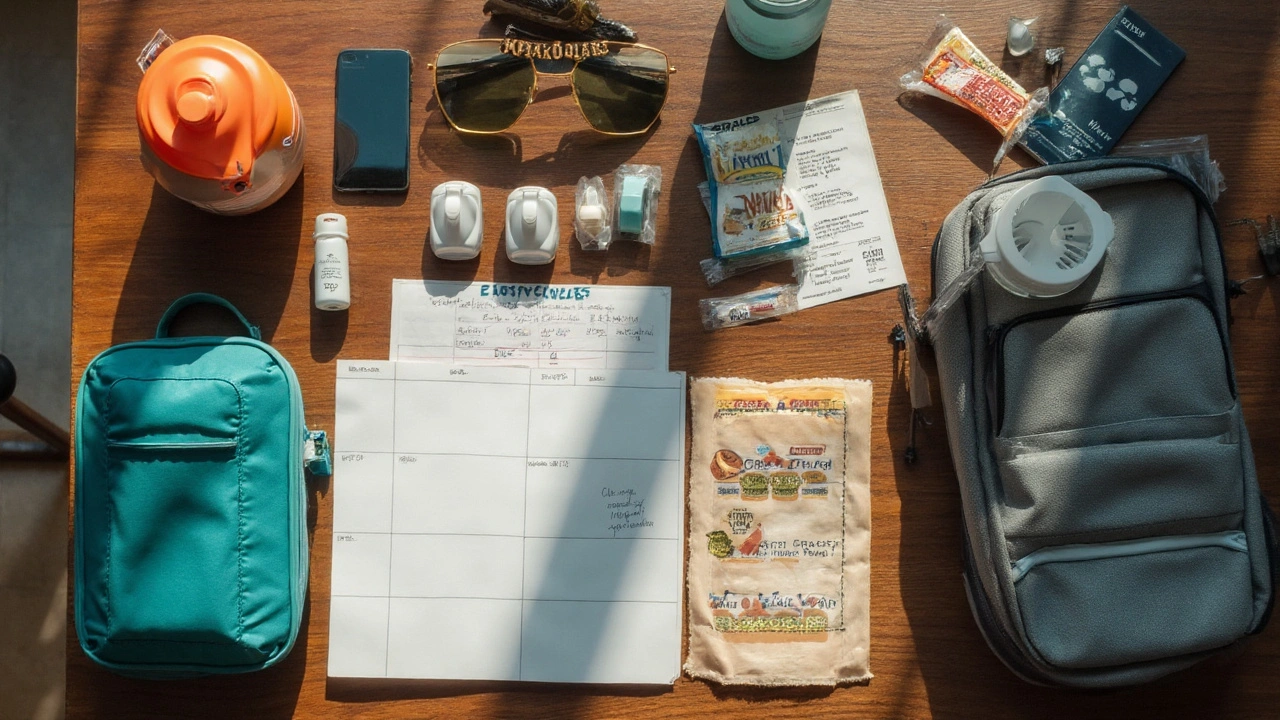Practical Hypophosphatemia Travel Tips for a Safe Trip
If you have low phosphate levels, traveling can feel risky, but it doesn’t have to be. A few simple steps keep your body balanced, so you can enjoy new places without panic.
First, know what hypophosphatemia does. Low phosphate can cause muscle weakness, fatigue, and sometimes trouble breathing. Those symptoms can get worse if you’re dehydrated, eating poorly, or sitting for long flights. Knowing your personal triggers helps you plan ahead.
Before You Go
Start with a quick chat with your doctor. Ask for a recent blood test, an updated prescription, and a written note that explains your condition. Many airlines let you carry medication in your carry‑on, but a note makes security smoother.
Pack smart. Keep your phosphate supplement in its original bottle, labeled clearly. Bring enough for the whole trip plus a few extra days in case of delays. If you travel internationally, check if the supplement is legal in the destination country.
Hydration is key. Low phosphate often worsens when you lose fluids, so bring a reusable water bottle. Aim for at least eight glasses a day, more if you’re in a hot climate or doing a lot of walking.
Plan your meals. Foods high in phosphate include dairy, nuts, beans, and lean meat. Research local cuisine and note where you can find these foods. For a quick boost, carry a small packet of powdered phosphate supplement that mixes with water.
Don’t forget a medical ID. A bracelet or card that says “Hypophosphatemia – needs phosphate supplement” alerts emergency staff instantly. It’s a small step that can save time if you get sick abroad.
While You’re On The Road
Stick to a regular supplement schedule. Set alarms on your phone if you’re changing time zones. Even if the day feels long, taking your dose at the same interval keeps blood levels steady.
Watch for signs of worsening symptoms: sudden weakness, tingling, or trouble breathing. If you notice these, stop any strenuous activity, hydrate, and take an extra supplement dose if your doctor said it’s safe.
Know where the nearest pharmacy or clinic is. Use map apps to pinpoint places that sell your supplement or can run a quick blood test. Having this info saved offline helps if you lose signal.
If you’re flying, move around every hour to keep circulation flowing. Stretch, walk the aisle, and sip water regularly. Cabin pressure can affect electrolyte balance, so staying active reduces risk.
Travel insurance that covers medication and lab work is worth the cost. Check the policy details before you book, and keep a digital copy of your prescription handy.
Finally, stay flexible. If you’re feeling off, switch to a low‑key day, rest, and focus on easy, phosphate‑rich foods. Your adventure won’t be ruined by a brief pause; it’s better to recover than push through a health scare.
With a bit of preparation, hypophosphatemia doesn’t have to limit your travel dreams. Keep these tips in mind, stay aware of your body, and enjoy the journey with confidence.
Hypophosphatemia Travel Tips: Safe Flying, Time‑Zone Dosing, and On‑the‑Go Management
- Benjamin Aghaki-Allen
- Health
- 18 comment
Traveling with hypophosphatemia? Practical tips for meds, time zones, flights, food, heat, illness, and emergencies-so you stay steady and enjoy the trip.
VIEW MORECategories
Popular posts
-
American Ginseng Benefits: Boost Energy, Immunity & Mood Naturally
Benjamin Aghaki-Allen -
Antitrust Issues in Generic Substitution: How Pharma Tactics Block Cheaper Drugs
Benjamin Aghaki-Allen -
AFib and Depression: How to Cope with Symptoms, Treatment, and Daily Life
Benjamin Aghaki-Allen -
How to Buy Cheap Generic Celexa Online Safely
Benjamin Aghaki-Allen -
Buy Online Cheap Generic Nexium - Safe and Smart Guide
Benjamin Aghaki-Allen
Popular tags
- side effects
- medication safety
- online pharmacy
- generic drugs
- medication errors
- drug side effects
- dietary supplement
- gut health
- blood pressure medication
- alternatives
- medication adherence
- Hatch-Waxman Act
- drug interactions
- weight loss
- dosage
- weight management
- quality of life
- cheap generic Zoloft
- affordable sertraline
- Claritin
